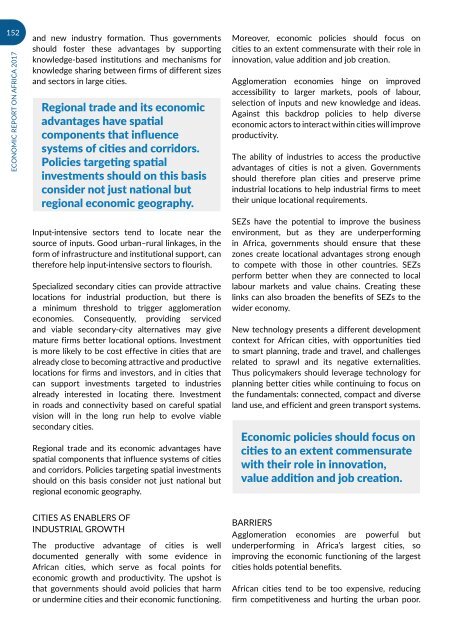URBANIZATION AND INDUSTRIALIZATION
Economic%20Report%20on%20Africa%202017%20UNECA
Economic%20Report%20on%20Africa%202017%20UNECA
You also want an ePaper? Increase the reach of your titles
YUMPU automatically turns print PDFs into web optimized ePapers that Google loves.
152<br />
ECONOMIC REPORT ON AFRICA 2017<br />
and new industry formation. Thus governments<br />
should foster these advantages by supporting<br />
knowledge-based institutions and mechanisms for<br />
knowledge sharing between firms of different sizes<br />
and sectors in large cities.<br />
Regional trade and its economic<br />
advantages have spatial<br />
components that influence<br />
systems of cities and corridors.<br />
Policies targeting spatial<br />
investments should on this basis<br />
consider not just national but<br />
regional economic geography.<br />
Input-intensive sectors tend to locate near the<br />
source of inputs. Good urban–rural linkages, in the<br />
form of infrastructure and institutional support, can<br />
therefore help input-intensive sectors to flourish.<br />
Specialized secondary cities can provide attractive<br />
locations for industrial production, but there is<br />
a minimum threshold to trigger agglomeration<br />
economies. Consequently, providing serviced<br />
and viable secondary-city alternatives may give<br />
mature firms better locational options. Investment<br />
is more likely to be cost effective in cities that are<br />
already close to becoming attractive and productive<br />
locations for firms and investors, and in cities that<br />
can support investments targeted to industries<br />
already interested in locating there. Investment<br />
in roads and connectivity based on careful spatial<br />
vision will in the long run help to evolve viable<br />
secondary cities.<br />
Regional trade and its economic advantages have<br />
spatial components that influence systems of cities<br />
and corridors. Policies targeting spatial investments<br />
should on this basis consider not just national but<br />
regional economic geography.<br />
Moreover, economic policies should focus on<br />
cities to an extent commensurate with their role in<br />
innovation, value addition and job creation.<br />
Agglomeration economies hinge on improved<br />
accessibility to larger markets, pools of labour,<br />
selection of inputs and new knowledge and ideas.<br />
Against this backdrop policies to help diverse<br />
economic actors to interact within cities will improve<br />
productivity.<br />
The ability of industries to access the productive<br />
advantages of cities is not a given. Governments<br />
should therefore plan cities and preserve prime<br />
industrial locations to help industrial firms to meet<br />
their unique locational requirements.<br />
SEZs have the potential to improve the business<br />
environment, but as they are underperforming<br />
in Africa, governments should ensure that these<br />
zones create locational advantages strong enough<br />
to compete with those in other countries. SEZs<br />
perform better when they are connected to local<br />
labour markets and value chains. Creating these<br />
links can also broaden the benefits of SEZs to the<br />
wider economy.<br />
New technology presents a different development<br />
context for African cities, with opportunities tied<br />
to smart planning, trade and travel, and challenges<br />
related to sprawl and its negative externalities.<br />
Thus policymakers should leverage technology for<br />
planning better cities while continuing to focus on<br />
the fundamentals: connected, compact and diverse<br />
land use, and efficient and green transport systems.<br />
Economic policies should focus on<br />
cities to an extent commensurate<br />
with their role in innovation,<br />
value addition and job creation.<br />
CITIES AS ENABLERS OF<br />
INDUSTRIAL GROWTH<br />
The productive advantage of cities is well<br />
documented generally with some evidence in<br />
African cities, which serve as focal points for<br />
economic growth and productivity. The upshot is<br />
that governments should avoid policies that harm<br />
or undermine cities and their economic functioning.<br />
BARRIERS<br />
Agglomeration economies are powerful but<br />
underperforming in Africa’s largest cities, so<br />
improving the economic functioning of the largest<br />
cities holds potential benefits.<br />
African cities tend to be too expensive, reducing<br />
firm competitiveness and hurting the urban poor.


